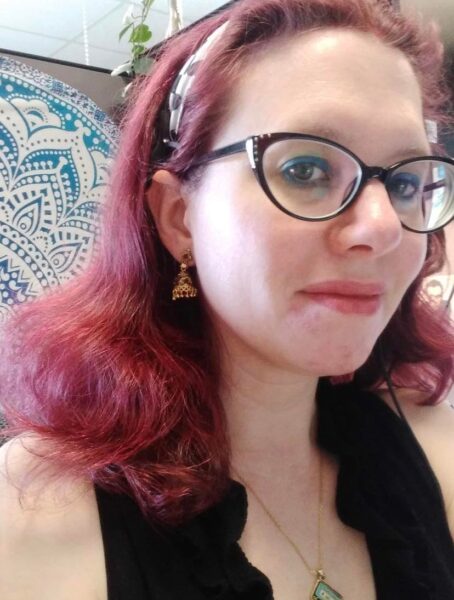Telling “Charon’s Purse” through a series of vignettes not only creates a parallel between the death of Art and the protagonist’s mother, but it also centers the protagonist so that she connects two otherwise unconnected people. Was it always your intention to write the story this way or was this form something that developed while writing?
First off, I want to note that this story—specifically, the images of Art and the diamonds—came to me in a dream. So I think from waking, I always knew it had to be vignettes, because there wasn’t a whole “story” there just yet. I write a lot from dreams, in part, because they allow me to break out of my “writer brain”—this is how you structure a story, these are the plots and characters—and allow me to focus more on language and imagery. The form itself also allows the reader to experience Art’s space as sacred—a break from her own reality, where she is cared for and has someone receptive to her care—and her mother’s illness, where she is solely the caretaker.
I want to also give a shout-out to the twice-weekly Barrelhouse Write-Ins, where I wrote this. Having a space that’s set aside from my normal writing practice really gave me the freedom to try something different and play around with form.
In both her working relationship with Art and her familial relationship with her mother, the protagonist seems well practiced at keeping certain areas of her life compartmentalized. And the use of the second-person point of view accentuates this juxtaposition between intimacy and distance. How do you strike that perfect balance of writing a character who is both memorable as an individual with a unique experience, and universal in way that allows your reader to feel comfortable enough take on their point of view?
I’m a big fan of second-person present tense in flash fiction because it does endear an immediate sense of intimacy at a moment where you cannot spare a single word. It is right there, it is so urgent, the reader has no choice but to be present to the experience the same way the protagonist is. It can be uneasy, but it can also be very generous, and I like that.
There’s a line of dialogue from Art that has been stuck in my head since reading your story. He tells the protagonist, “What we consume, we keep secret.” Is consuming a secret the best way to keep it? Are there easier ways of swallowing a diamond?
You either consume the secret or it consumes you.
Several of your characters spend time questioning their worth: Art doesn’t believe his body is worthy of pleasure and the mother doesn’t believe she’s worth the money her family is spending. Even the protagonist questions whether she’s worthy of Art’s diamonds or the sacrifices her mother made to provide for the family. But she also recognizes that what something costs doesn’t necessarily match its worth. When have you experienced something costing more or less than it was worth? What was the most valuable takeaway from your experience?
Conference hotels. It’s been forever since I’ve done a conference like AWP, but you pay two hundred dollars-plus a night for a room you barely exist in, for the pleasure of a lumpy bed and bad coffee and a mini-bar that breaks your credit card if you look at it wrong. And you tell yourself it’s worth it because you’re making connections, but the truth is that there’s thirteen thousand people staying in that hotel and other ones around whatever city you’ve all descended upon for the weekend, and all you got for that price was a couple of drinks and a T-shirt you’ll never wear.
I say this knowing full well that I would give anything to go to AWP again, that my jealousy seeing everyone’s tweets from the book fair will consume me like hellfire.
Traditionally, the cost of one of Charon’s ferry rides is a coin or two, but who are we to say if the afterlife is immune from inflation. What are some other forms of payment Charon might currently be accepting for a ride across River Styx?
Money varies from age to age, country to country, but you can always pay with a kiss, a pizza, or help moving a couch.



 The core workshop of SmokeLong Fitness is all in writing, so you can take part from anywhere at anytime. We are excited about creating a supportive, consistent and structured environment for flash writers to work on their craft in a community. We are thrilled and proud to say that our workshop participants have won, placed, or been listed in every major flash competition. Community works.
The core workshop of SmokeLong Fitness is all in writing, so you can take part from anywhere at anytime. We are excited about creating a supportive, consistent and structured environment for flash writers to work on their craft in a community. We are thrilled and proud to say that our workshop participants have won, placed, or been listed in every major flash competition. Community works.